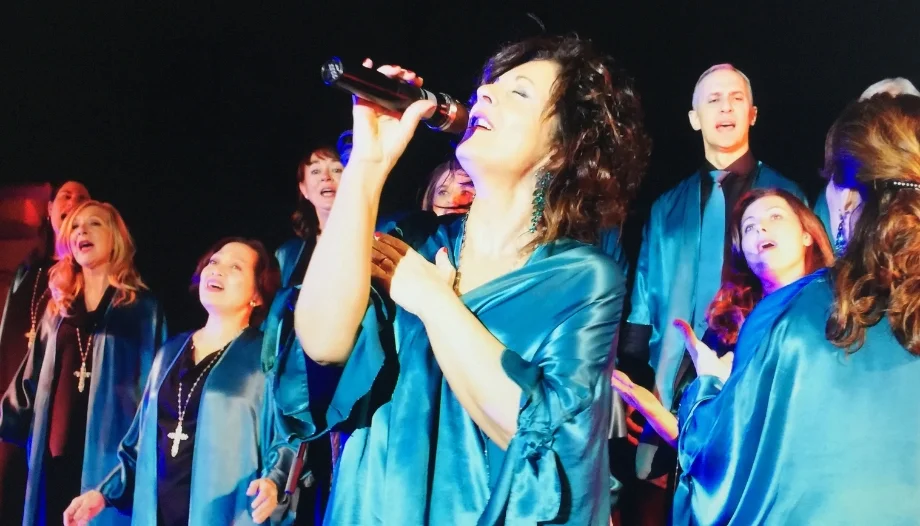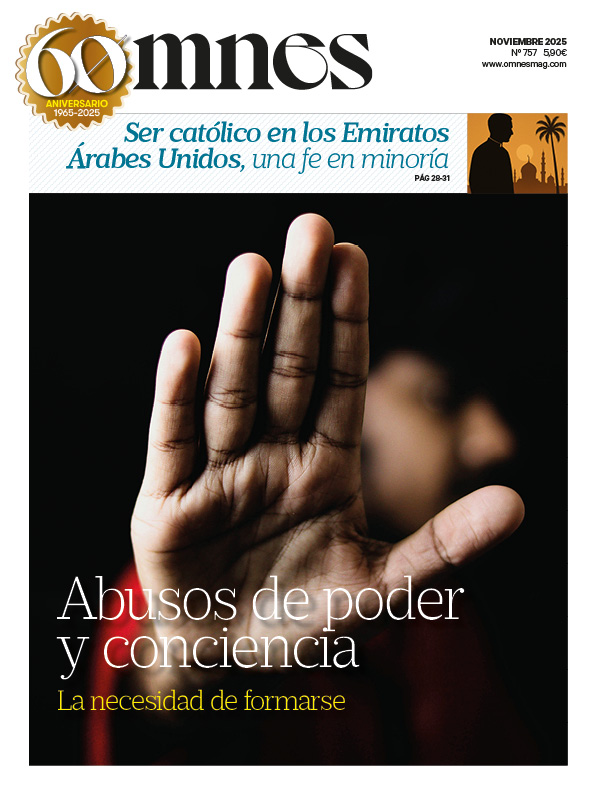Matina, Maite Zuazola's stage name, is a singer, composer and musical director from Bilbao who has turned her talent into an instrument of evangelization. Trained since she was a child in classical music and with an extensive career in genres such as jazz, soul or musical theater, she found her true vocation in gospel music: to sing to God and transmit the joy of the Gospel through music.
In 2012 he founded in Madrid the choir Gospel Freedom, a community of voices united by faith and passion for Christian music. Under his direction, the group has grown to become a reference point for Catholic gospel in Spain, performing in churches, festivals, charity events and television programs. Their mission is clear: «to sing to God in Spirit and Truth and, through our songs, to infect souls with the joy of salvation, so much so that their bodies desire to dance and express themselves”.
In this interview, Matina shares her testimony of faith, her journey of conversion and the inspiration from which the project was born. Matina and Gospel Freedom, winner of the Religion in Freedom Christian Music Award this 2025.
Maite, how would you describe the moment or process in which you felt Jesus calling you personally to give Him glory?
-His call was a surprise, and the mission he was entrusting to me. Jesus took me back home, as I had asked him one day. He took me back to The Church and to work from there. My first call was to music when I was 7 years old.
My paternal grandmother was a school teacher, a music teacher, and a woman of deep faith. One day in her house in Portugalete (Vizcaya), when she was playing the piano, I felt a force that attracted me to that music and I stood next to her while she played. He asked me if I wanted to learn and I said yes. Later I understood that this force was the Holy Spirit.
My grandmother became my mentor. She taught me solfeggio and took me by the hand to church, and so on for 4 years that I lived with her. This was key.
But when I left his house, I left the church. I finished my piano career and discovered voice. I worked in the artistic world for years until one day I realized that it was not enough, there was an emptiness inside me that I could not fill. Then I thought I wanted to start a family. I left my life in Madrid and got married.
My desert began. At that time I cried out to God, because I felt that my marriage, in which I had put all my hopes, even abandoning my musical career to create a family, was not going well. There were hard trials that can only be overcome in a true union. For me, marriage is sacred.
In the tribulation I began to talk to God. Jesus attracted me. I remembered the gospel music my father listened to... I missed the music. I missed myself. After 10 years, providence brought me back to Madrid, and then I felt I was coming back... In my joy I went to the nearest church with my oldest son, who was 8 years old at the time. During Mass, I received the call. And I came back, back to faith and back to music! It was an incredible time, I was happy in spite of my personal situation.
Looking back I have seen the whole process. God patiently prepared me and waited for my return. The day would come when everything would come together for the mission, and it did.
How was the Gospel Choir Libertad born?
-The Gospel choir was born out of conversion. A total inspiration. I proposed it to the parish and the door opened wide.
Christian music, and in particular gospel music, is perfectly in tune with the joy of being a Christian. I resumed my role as a composer, but now I had no choice but to focus on God's music. It was quite a discovery. Christian music was a necessity that expressed, and continues to express, what my heart carries.
Gospel has African-American and Protestant roots. What moved you to translate that musical spirituality into the Catholic context? What does gospel preserve and what does it transform when sung from the Catholic faith?
-Gospel music is praise music with a lot of rhythm and quality. Its beautiful melodies, with a brilliant rhythm, are an invitation to live the faith in joy and in the hope of the free salvation offered to us by our Lord Jesus Christ. Praising God in spirit and truth has no denomination.
Catholic praise offers even more than Protestant praise, since it can praise the Eucharist and the Mother of God. In my case I have compositions with these characteristics, such as The Greatest Gift, referring to the Eucharist, Five letters that praises Mary and the Holy gospel, which is a tribute to the Saint of the Mass. Other themes of our latest album are psalms made song as are I trust you based on Psalm 91 and Sing to the Lordr, which is the psalm from Isaiah 12. Our Father to the rhythm of gospel.
What does it mean to you to evangelize through music? How can gospel be a missionary language for today's society?
-Evangelizing through music is our mission to carry out the command of our Lord: “Go and proclaim the gospel...” . The Holy Spirit pours out his gifts and charisms for us to put them at our service. It could be said that gospel has a special charisma, for it is a powerful music that pierces. No one remains indifferent after a gospel concert expressed from the heart. This is key. Unfortunately there are many gospel choirs that do not live what they sing, so they do not transmit it either. There are no results if there is no intention. They are not choirs for evangelization. The challenge of Matina and Gospel Freedom is to be an authentic gospel choir.
How do you integrate prayer and personal spiritual life into your artistic work and choir directing?
-It is precisely the work of the choir that keeps me in constant prayer. Preparing the songs, taking out the different voices, the harmonies, adapting the lyrics to Spanish or composing new songs are my means to be in constant contact with the Lord. I truly feel it is a privilege to have this wonderful gift that is my direct and immediate connection.
How do you see the growth of Catholic gospel in Spain and the world? Do you think it can become a powerful evangelizing movement?
-In Spain there are gospel choirs, of course, but not Catholic choirs dedicated to evangelization. Matina and Góspel Libertad are an exception.
I do believe that it could be a powerful evangelizing movement, as it already happens in other denominations. In Spain it could also do a great job as long as it is carried out with quality, true enthusiasm and real support. Unfortunately there is a great lack of the latter, which makes the work sometimes wearisome and a real struggle.








